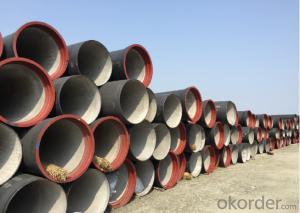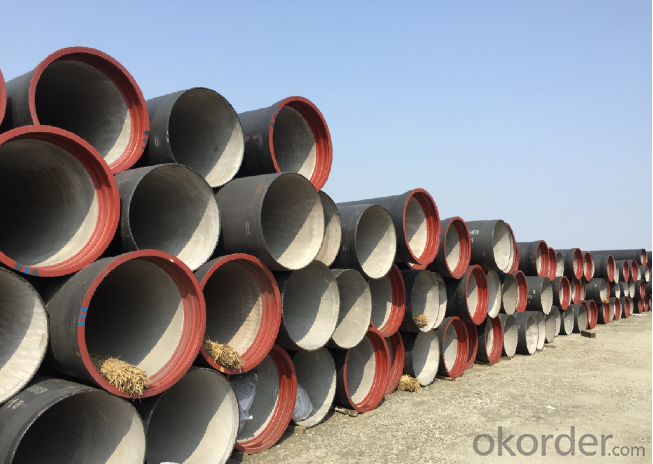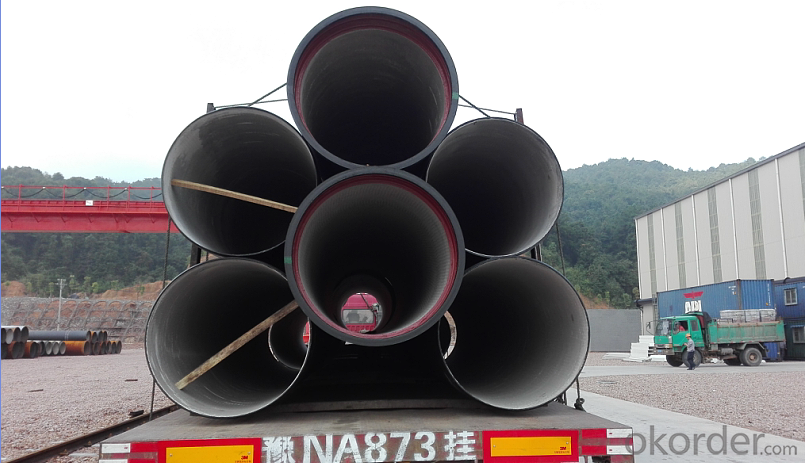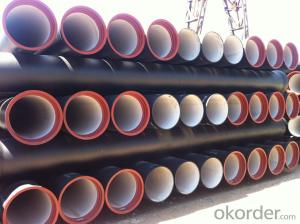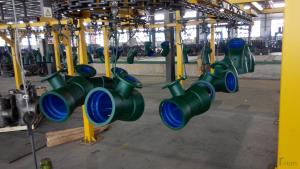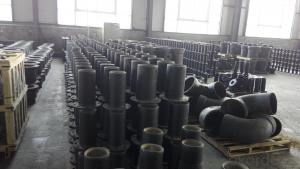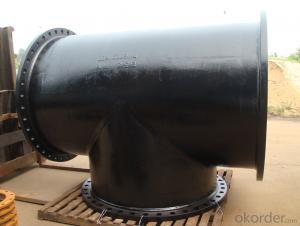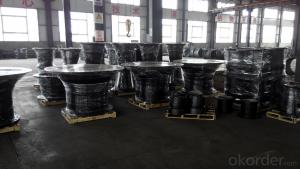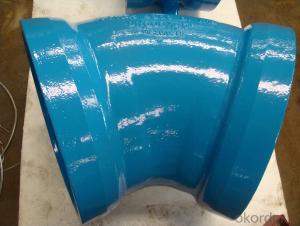Ductil cast iron pipes, iron pipes, Ductil cast
- Loading Port:
- Xiamen
- Payment Terms:
- TT OR LC
- Min Order Qty:
- 10 pc
- Supply Capability:
- 1000 pc/month
OKorder Service Pledge
OKorder Financial Service
You Might Also Like
Ductile iron is manufactured by melitng, spheroidization, inoculation, and pouring. The manesium alloy addition produces a remarkable change in the mocrostructure by causing the carbon in the iron to aasume the spheroidal shapes. The spheroidal praphites are using the silicon alloy to inoculation treatment, at the same time, producing a finer grained iron matrix in the surrounging ferrite structure. As a result of this remarkable change, a far stonger, tougher and ductile material is obtained.
Our product have more than 30 years experience in waterworks industry, voasting advanced concepts and tremendous technological strength. We are dediate to design, manufacture and management of large diameter ductil cast iron pipes, precision casting, water supply equipment, wastewater treatment and seawater desalination. So if you have similar project, we can offer you a complete resolution.
Small quantity purchase can be shipped by containers, special size or big quantity should be shipped by bulk steak.
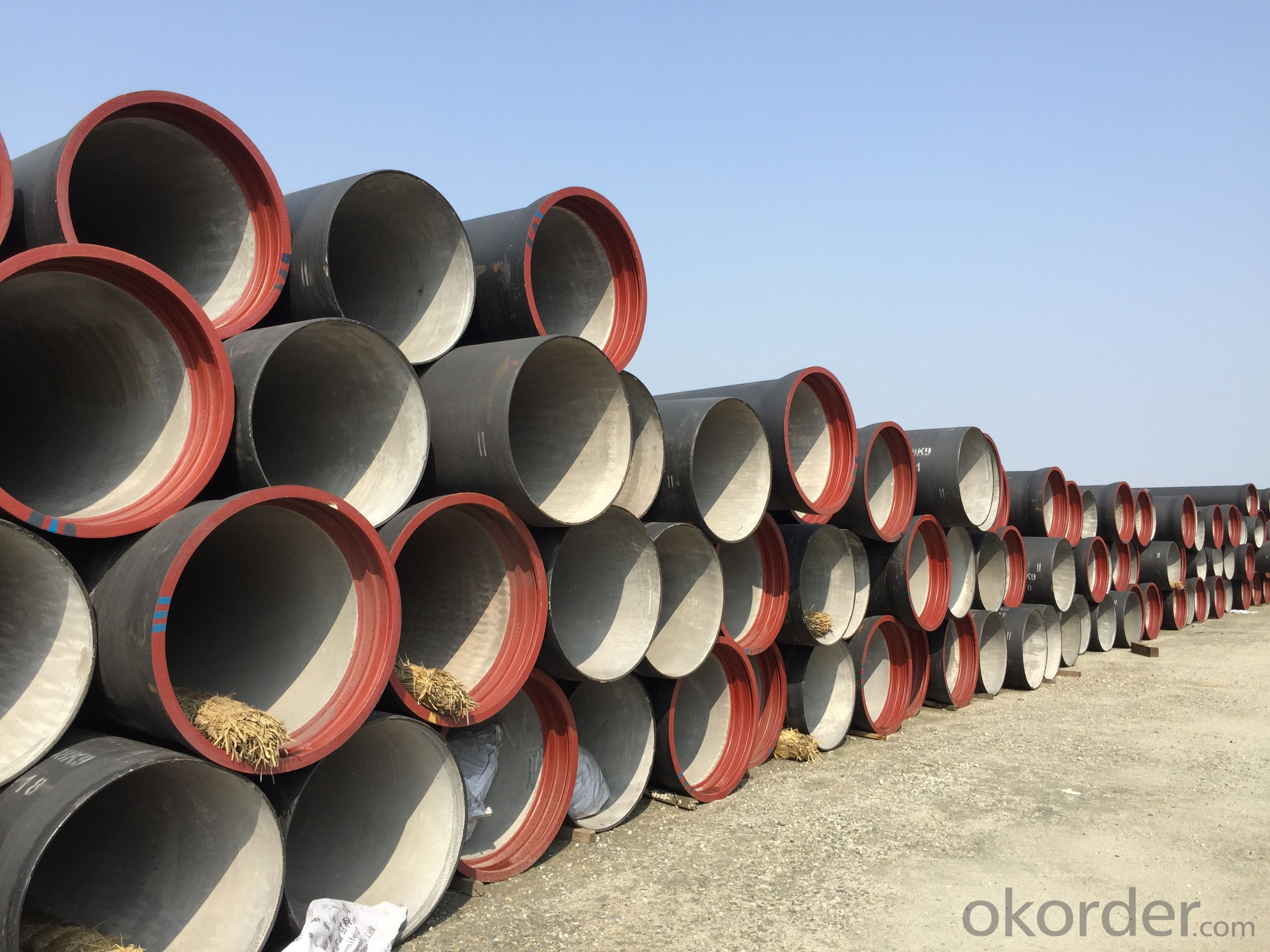
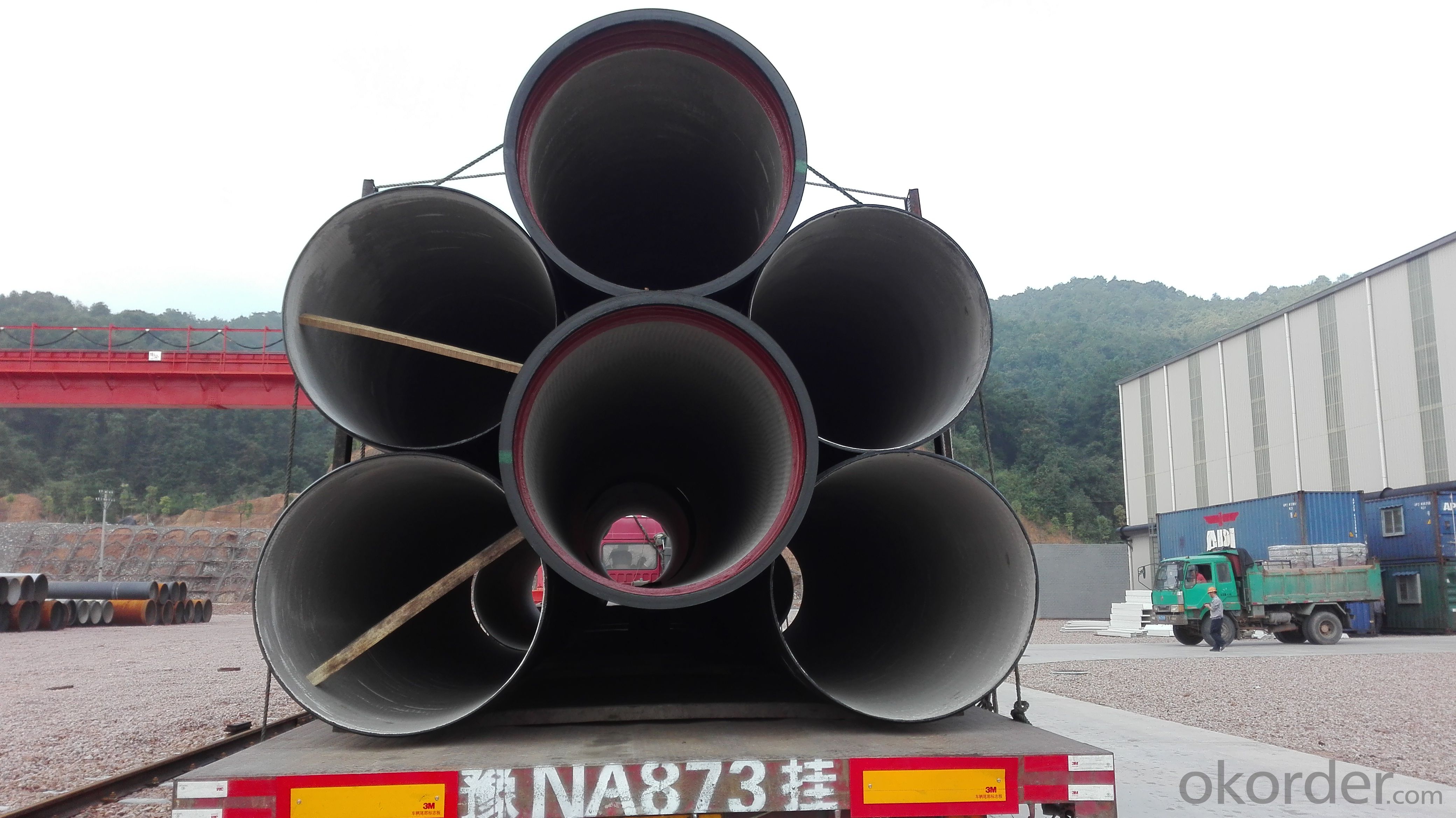
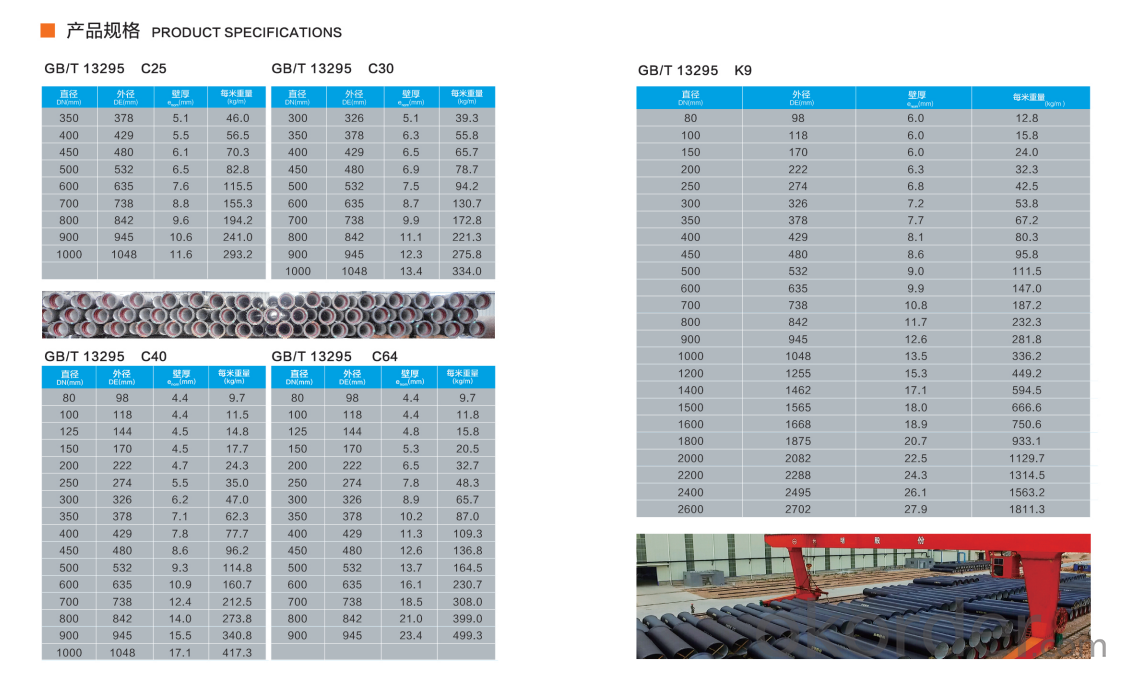
- Q: What are the common methods for cutting ductile iron pipes?
- Some common methods for cutting ductile iron pipes include using a handheld reciprocating saw with a metal-cutting blade, using a portable bandsaw, using a chop saw with a diamond-tipped blade, and using a pipe cutter specifically designed for ductile iron pipes. Additionally, some professionals may also use oxy-fuel or plasma cutting methods for larger diameter pipes.
- Q: How do ductile iron pipes handle pressure surges in pumping stations?
- Ductile iron pipes excel at effectively managing pressure surges in pumping stations. The exceptional strength and flexibility of ductile iron make it an excellent choice for withstanding sudden increases in pressure that can occur during pump start-up or shutdown. One of the standout qualities of ductile iron pipes is their remarkable capacity to absorb and distribute energy. When a pressure surge arises, these pipes can absorb the excess pressure and evenly distribute it throughout the pipe network. This capability greatly reduces the impact of the surge and safeguards against potential damage to the pipes or pumping station. Furthermore, ductile iron pipes possess a high resistance to impact and stress, which further bolsters their ability to handle pressure surges. Their manufacturing process imparts a unique strength and durability that allows them to endure the forces exerted during pressure fluctuations without significant deformation or failure. Moreover, ductile iron pipes boast a smooth internal surface that minimizes friction and turbulence within the pipe network. This smooth flow characteristic helps mitigate the effects of pressure surges by ensuring efficient movement of water without placing additional stress on the pipes. In conclusion, ductile iron pipes are meticulously engineered to handle pressure surges in pumping stations. They excel at absorbing and dissipating excess pressure, enduring impact and stress, and promoting smooth flow. Their robustness and reliability make them the ideal choice for applications where pressure fluctuations are prevalent, guaranteeing the longevity and efficiency of pumping infrastructure.
- Q: Are ductile iron pipes suitable for potable water distribution systems?
- Yes, ductile iron pipes are suitable for potable water distribution systems. Ductile iron is a type of cast iron that is known for its high strength and durability, making it an excellent choice for conveying drinking water. These pipes are resistant to corrosion, which is essential for maintaining the quality and safety of potable water. Additionally, ductile iron pipes have a smooth interior surface, which helps to minimize the accumulation of sediments and biofilms that can affect water quality. They also have the ability to withstand high pressure and temperature changes, making them suitable for various potable water distribution systems. Overall, ductile iron pipes are a reliable and widely used option for ensuring the delivery of safe and clean drinking water to communities.
- Q: Can ductile iron pipes be used for water supply in remote areas?
- Yes, ductile iron pipes can be used for water supply in remote areas. Ductile iron pipes are known for their strength, durability, and versatility, making them suitable for various applications, including water supply systems. These pipes have a high resistance to corrosion and can withstand harsh environmental conditions, making them ideal for remote areas where the availability of maintenance and repair services may be limited. Additionally, ductile iron pipes have a longer lifespan compared to other materials, ensuring the longevity of the water supply system in remote areas. Overall, ductile iron pipes are a reliable choice for water supply in remote areas due to their durability, corrosion resistance, and long lifespan.
- Q: What are the different joint restraint systems available for ductile iron pipe?
- Some of the different joint restraint systems available for ductile iron pipe include mechanical joint restraints, push-on joint restraints, and restrained joint systems.
- Q: Can ductile iron pipe be used for desalination plants?
- Yes, ductile iron pipe can be used for desalination plants. Ductile iron has excellent corrosion resistance properties, making it suitable for handling the corrosive nature of desalinated water. Additionally, its high strength and durability make it a reliable choice for transporting water in such plants.
- Q: How do ductile iron pipes handle soil erosion?
- Ductile iron pipes are highly resistant to soil erosion due to their robust construction and inherent strength. The pipes' durable and flexible nature allows them to withstand the impact of soil movement and erosion without significant damage. Moreover, the corrosion-resistant coatings applied to ductile iron pipes further enhance their ability to resist erosion caused by soil particles and other corrosive elements. Overall, ductile iron pipes provide a reliable and long-lasting solution for handling soil erosion in various applications.
- Q: How much is the working pressure of ductile iron pipe used in water supply pipe and how is MPa determined?
- No, the work pressure is generally 0.4~1.6MPa, but the ultimate test pressure of ductile iron pipes is about 4.0MPa.
- Q: Can ductile iron pipe be used for cooling water systems?
- Certainly, cooling water systems can utilize ductile iron pipe. With its exceptional corrosion resistance, remarkable tensile strength, and ability to withstand high-pressure scenarios, ductile iron pipe proves itself suitable for a range of applications, including cooling water systems. Its durability and versatility ensure the efficient transportation and distribution of cooling water, eliminating the likelihood of leakage or malfunction. Moreover, ductile iron pipe is renowned for its extended lifespan and minimal upkeep demands, rendering it an economically sound option for cooling water systems.
- Q: Can ductile iron pipes be used in mining applications?
- Yes, ductile iron pipes can be used in mining applications. Ductile iron is known for its high strength and durability, making it suitable for use in demanding environments such as mines. These pipes have excellent resistance to corrosion, which is essential when dealing with water or other liquids that may contain chemicals or minerals. Additionally, ductile iron pipes have good impact resistance, making them capable of withstanding the rough conditions often found in mining operations. They are also easy to install and maintain, allowing for efficient and cost-effective use in mining applications. Overall, ductile iron pipes are a reliable choice for transporting water, slurry, or other substances in mining operations.
Send your message to us
Ductil cast iron pipes, iron pipes, Ductil cast
- Loading Port:
- Xiamen
- Payment Terms:
- TT OR LC
- Min Order Qty:
- 10 pc
- Supply Capability:
- 1000 pc/month
OKorder Service Pledge
OKorder Financial Service
Similar products
Hot products
Hot Searches
Related keywords
